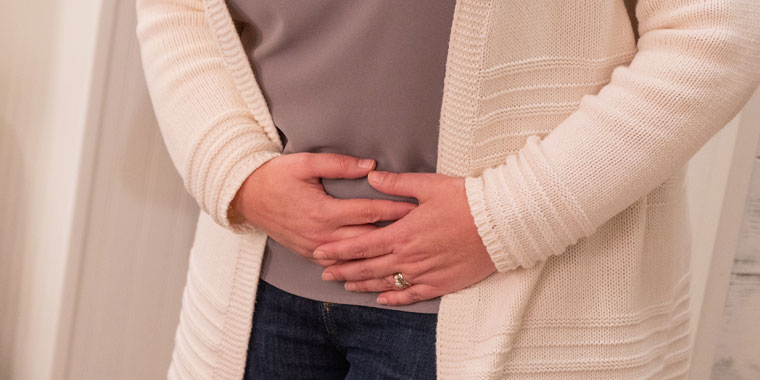Cancer
When cells in your body grow out of control, cancer results. And it can spread to other parts of your body. Premier Health providers offer advice on how to lower your risk of developing cancer, how to recognize cancer signs, and how cancer is diagnosed
to help catch it early and raise the chance of successful treatment.
Don’t Let Latest Study Mislead You: Colonoscopy Is a Real Lifesaver

Find Your Perfect Match
Answer a few questions and we'll provide you with a list of primary care providers that best fit your needs.
Medical professionals, health organizations, and celebrities like Ryan Reynolds and Katie Couric frequently promote colonoscopy as a life-saving screening tool to prevent and detect, at early stages, colorectal cancer – the second-most common cancer in the U.S.
James Ouellette, DO, a surgical oncologist with Premier Health, shared with Premier Health Now that he remains a steadfast believer in the value of colonoscopies, despite the finding of a recent European study. Published in the New England Journal of Medicine, the study suggests that colonoscopies may not be as effective as previous studies have indicated.
“It seems strange that one study out of countless studies seems to suggest that colonoscopy is not an effective screening test,” Dr. Ouellette told us. “A significant number of studies over the years have shown the contrary.”
He adds, “We spend our time trying to find better, more effective testing and screening and it’s disheartening to have a publication that calls that into question.”
The new study found that colonoscopies cut the risk of colon cancer by about a fifth and did not significantly lower the risk of colon cancer deaths. This compares, for instance, with a 2018 Kaiser Permanente study, which showed that screening colonoscopies lowered cancer deaths by 67 percent.
The new study deserves scrutiny, Dr. Ouellette says. Among the study’s shortcomings: Only 42 percent of study participants, who were invited to get a colonoscopy, actually got one. The results were better for these individuals than for the overall study group. Their risk of developing colon cancer decreased by about 31 percent and their risk of death, by about 50 percent.
Improving Colorectal Cancer Prevention
In a continuing drive to increase the effectiveness of colonoscopy as a screening tool to prevent colorectal cancer, the recommended age for your first screening colonoscopy was recently lowered from 50 to 45. “What prompted this was that we were seeing more people in the U.S. under the age of 50 presenting with colorectal cancer,” Dr. Ouellette explains.
However, he adds, if you have a family history of colorectal cancer, you should schedule your first colonoscopy about 10 years before the age that your family member was diagnosed.
A screening colonoscopy can prevent colorectal cancer by helping your doctor find and remove pre-cancerous growths, called polyps. These could become cancerous if allowed to continue growing.
Colonoscopy is also used to examine patients who report symptoms of colorectal cancer, which, according to the American Cancer Society (ACS), include:
- A change in bowel habits. This may include diarrhea, constipation, or narrowing of the stool, lasting for more than a few days
- A feeling that you need to have a bowel movement that is not relieved by having one
- Rectal bleeding with bright red blood
- Blood in the stool, which can make it look dark brown or black
- Cramping or belly pain
- Weakness and fatigue
- Unintentional weight loss
The ACS reports that the rate of colon or rectal cancer diagnoses has decreased each year since the mid-1980s. Why? Primarily due to more people being screened and reducing their lifestyle-related risk factors. Colorectal cancer rates dropped about 1 percent a year from 2013 to 2017, the ACS says.
Most of this drop, though, is attributed to older patients. The rate for people younger than 50 increased 2 percent a year from 2012 through 2016, and 1 percent a year for adults 50 to 64.
The time it takes to prepare for a colonoscopy and to have the procedure, Dr. Ouellette says, allows you to gain “significant peace of mind. And if you ask a person who has had colorectal cancer, their treatment can range from a couple of months to the rest of their lives. Is half a day of preparation that bad when you look at the potential alternative?”
Find Your Perfect Match
Answer a few questions and we'll provide you with a list of primary care providers that best fit your needs.
Sources: James Ouellette, DO, Premier Surgical Oncology; NPR; American Cancer Society; CNN
Don’t Let Latest Study Mislead You: Colonoscopy Is a Real Lifesaver

Find Your Perfect Match
Answer a few questions and we'll provide you with a list of primary care providers that best fit your needs.
Medical professionals, health organizations, and celebrities like Ryan Reynolds and Katie Couric frequently promote colonoscopy as a life-saving screening tool to prevent and detect, at early stages, colorectal cancer – the second-most common cancer in the U.S.
James Ouellette, DO, a surgical oncologist with Premier Health, shared with Premier Health Now that he remains a steadfast believer in the value of colonoscopies, despite the finding of a recent European study. Published in the New England Journal of Medicine, the study suggests that colonoscopies may not be as effective as previous studies have indicated.
“It seems strange that one study out of countless studies seems to suggest that colonoscopy is not an effective screening test,” Dr. Ouellette told us. “A significant number of studies over the years have shown the contrary.”
He adds, “We spend our time trying to find better, more effective testing and screening and it’s disheartening to have a publication that calls that into question.”
The new study found that colonoscopies cut the risk of colon cancer by about a fifth and did not significantly lower the risk of colon cancer deaths. This compares, for instance, with a 2018 Kaiser Permanente study, which showed that screening colonoscopies lowered cancer deaths by 67 percent.
The new study deserves scrutiny, Dr. Ouellette says. Among the study’s shortcomings: Only 42 percent of study participants, who were invited to get a colonoscopy, actually got one. The results were better for these individuals than for the overall study group. Their risk of developing colon cancer decreased by about 31 percent and their risk of death, by about 50 percent.
Improving Colorectal Cancer Prevention
In a continuing drive to increase the effectiveness of colonoscopy as a screening tool to prevent colorectal cancer, the recommended age for your first screening colonoscopy was recently lowered from 50 to 45. “What prompted this was that we were seeing more people in the U.S. under the age of 50 presenting with colorectal cancer,” Dr. Ouellette explains.
However, he adds, if you have a family history of colorectal cancer, you should schedule your first colonoscopy about 10 years before the age that your family member was diagnosed.
A screening colonoscopy can prevent colorectal cancer by helping your doctor find and remove pre-cancerous growths, called polyps. These could become cancerous if allowed to continue growing.
Colonoscopy is also used to examine patients who report symptoms of colorectal cancer, which, according to the American Cancer Society (ACS), include:
- A change in bowel habits. This may include diarrhea, constipation, or narrowing of the stool, lasting for more than a few days
- A feeling that you need to have a bowel movement that is not relieved by having one
- Rectal bleeding with bright red blood
- Blood in the stool, which can make it look dark brown or black
- Cramping or belly pain
- Weakness and fatigue
- Unintentional weight loss
The ACS reports that the rate of colon or rectal cancer diagnoses has decreased each year since the mid-1980s. Why? Primarily due to more people being screened and reducing their lifestyle-related risk factors. Colorectal cancer rates dropped about 1 percent a year from 2013 to 2017, the ACS says.
Most of this drop, though, is attributed to older patients. The rate for people younger than 50 increased 2 percent a year from 2012 through 2016, and 1 percent a year for adults 50 to 64.
The time it takes to prepare for a colonoscopy and to have the procedure, Dr. Ouellette says, allows you to gain “significant peace of mind. And if you ask a person who has had colorectal cancer, their treatment can range from a couple of months to the rest of their lives. Is half a day of preparation that bad when you look at the potential alternative?”
Find Your Perfect Match
Answer a few questions and we'll provide you with a list of primary care providers that best fit your needs.
Sources: James Ouellette, DO, Premier Surgical Oncology; NPR; American Cancer Society; CNN
Don’t Let Latest Study Mislead You: Colonoscopy Is a Real Lifesaver

Find Your Perfect Match
Answer a few questions and we'll provide you with a list of primary care providers that best fit your needs.
Medical professionals, health organizations, and celebrities like Ryan Reynolds and Katie Couric frequently promote colonoscopy as a life-saving screening tool to prevent and detect, at early stages, colorectal cancer – the second-most common cancer in the U.S.
James Ouellette, DO, a surgical oncologist with Premier Health, shared with Premier Health Now that he remains a steadfast believer in the value of colonoscopies, despite the finding of a recent European study. Published in the New England Journal of Medicine, the study suggests that colonoscopies may not be as effective as previous studies have indicated.
“It seems strange that one study out of countless studies seems to suggest that colonoscopy is not an effective screening test,” Dr. Ouellette told us. “A significant number of studies over the years have shown the contrary.”
He adds, “We spend our time trying to find better, more effective testing and screening and it’s disheartening to have a publication that calls that into question.”
The new study found that colonoscopies cut the risk of colon cancer by about a fifth and did not significantly lower the risk of colon cancer deaths. This compares, for instance, with a 2018 Kaiser Permanente study, which showed that screening colonoscopies lowered cancer deaths by 67 percent.
The new study deserves scrutiny, Dr. Ouellette says. Among the study’s shortcomings: Only 42 percent of study participants, who were invited to get a colonoscopy, actually got one. The results were better for these individuals than for the overall study group. Their risk of developing colon cancer decreased by about 31 percent and their risk of death, by about 50 percent.
Improving Colorectal Cancer Prevention
In a continuing drive to increase the effectiveness of colonoscopy as a screening tool to prevent colorectal cancer, the recommended age for your first screening colonoscopy was recently lowered from 50 to 45. “What prompted this was that we were seeing more people in the U.S. under the age of 50 presenting with colorectal cancer,” Dr. Ouellette explains.
However, he adds, if you have a family history of colorectal cancer, you should schedule your first colonoscopy about 10 years before the age that your family member was diagnosed.
A screening colonoscopy can prevent colorectal cancer by helping your doctor find and remove pre-cancerous growths, called polyps. These could become cancerous if allowed to continue growing.
Colonoscopy is also used to examine patients who report symptoms of colorectal cancer, which, according to the American Cancer Society (ACS), include:
- A change in bowel habits. This may include diarrhea, constipation, or narrowing of the stool, lasting for more than a few days
- A feeling that you need to have a bowel movement that is not relieved by having one
- Rectal bleeding with bright red blood
- Blood in the stool, which can make it look dark brown or black
- Cramping or belly pain
- Weakness and fatigue
- Unintentional weight loss
The ACS reports that the rate of colon or rectal cancer diagnoses has decreased each year since the mid-1980s. Why? Primarily due to more people being screened and reducing their lifestyle-related risk factors. Colorectal cancer rates dropped about 1 percent a year from 2013 to 2017, the ACS says.
Most of this drop, though, is attributed to older patients. The rate for people younger than 50 increased 2 percent a year from 2012 through 2016, and 1 percent a year for adults 50 to 64.
The time it takes to prepare for a colonoscopy and to have the procedure, Dr. Ouellette says, allows you to gain “significant peace of mind. And if you ask a person who has had colorectal cancer, their treatment can range from a couple of months to the rest of their lives. Is half a day of preparation that bad when you look at the potential alternative?”
Find Your Perfect Match
Answer a few questions and we'll provide you with a list of primary care providers that best fit your needs.
Sources: James Ouellette, DO, Premier Surgical Oncology; NPR; American Cancer Society; CNN
Cancer Information for Women
Don’t Let Latest Study Mislead You: Colonoscopy Is a Real Lifesaver

Find Your Perfect Match
Answer a few questions and we'll provide you with a list of primary care providers that best fit your needs.
Medical professionals, health organizations, and celebrities like Ryan Reynolds and Katie Couric frequently promote colonoscopy as a life-saving screening tool to prevent and detect, at early stages, colorectal cancer – the second-most common cancer in the U.S.
James Ouellette, DO, a surgical oncologist with Premier Health, shared with Premier Health Now that he remains a steadfast believer in the value of colonoscopies, despite the finding of a recent European study. Published in the New England Journal of Medicine, the study suggests that colonoscopies may not be as effective as previous studies have indicated.
“It seems strange that one study out of countless studies seems to suggest that colonoscopy is not an effective screening test,” Dr. Ouellette told us. “A significant number of studies over the years have shown the contrary.”
He adds, “We spend our time trying to find better, more effective testing and screening and it’s disheartening to have a publication that calls that into question.”
The new study found that colonoscopies cut the risk of colon cancer by about a fifth and did not significantly lower the risk of colon cancer deaths. This compares, for instance, with a 2018 Kaiser Permanente study, which showed that screening colonoscopies lowered cancer deaths by 67 percent.
The new study deserves scrutiny, Dr. Ouellette says. Among the study’s shortcomings: Only 42 percent of study participants, who were invited to get a colonoscopy, actually got one. The results were better for these individuals than for the overall study group. Their risk of developing colon cancer decreased by about 31 percent and their risk of death, by about 50 percent.
Improving Colorectal Cancer Prevention
In a continuing drive to increase the effectiveness of colonoscopy as a screening tool to prevent colorectal cancer, the recommended age for your first screening colonoscopy was recently lowered from 50 to 45. “What prompted this was that we were seeing more people in the U.S. under the age of 50 presenting with colorectal cancer,” Dr. Ouellette explains.
However, he adds, if you have a family history of colorectal cancer, you should schedule your first colonoscopy about 10 years before the age that your family member was diagnosed.
A screening colonoscopy can prevent colorectal cancer by helping your doctor find and remove pre-cancerous growths, called polyps. These could become cancerous if allowed to continue growing.
Colonoscopy is also used to examine patients who report symptoms of colorectal cancer, which, according to the American Cancer Society (ACS), include:
- A change in bowel habits. This may include diarrhea, constipation, or narrowing of the stool, lasting for more than a few days
- A feeling that you need to have a bowel movement that is not relieved by having one
- Rectal bleeding with bright red blood
- Blood in the stool, which can make it look dark brown or black
- Cramping or belly pain
- Weakness and fatigue
- Unintentional weight loss
The ACS reports that the rate of colon or rectal cancer diagnoses has decreased each year since the mid-1980s. Why? Primarily due to more people being screened and reducing their lifestyle-related risk factors. Colorectal cancer rates dropped about 1 percent a year from 2013 to 2017, the ACS says.
Most of this drop, though, is attributed to older patients. The rate for people younger than 50 increased 2 percent a year from 2012 through 2016, and 1 percent a year for adults 50 to 64.
The time it takes to prepare for a colonoscopy and to have the procedure, Dr. Ouellette says, allows you to gain “significant peace of mind. And if you ask a person who has had colorectal cancer, their treatment can range from a couple of months to the rest of their lives. Is half a day of preparation that bad when you look at the potential alternative?”
Find Your Perfect Match
Answer a few questions and we'll provide you with a list of primary care providers that best fit your needs.
Sources: James Ouellette, DO, Premier Surgical Oncology; NPR; American Cancer Society; CNN
Cancer Information for Men
Don’t Let Latest Study Mislead You: Colonoscopy Is a Real Lifesaver

Find Your Perfect Match
Answer a few questions and we'll provide you with a list of primary care providers that best fit your needs.
Medical professionals, health organizations, and celebrities like Ryan Reynolds and Katie Couric frequently promote colonoscopy as a life-saving screening tool to prevent and detect, at early stages, colorectal cancer – the second-most common cancer in the U.S.
James Ouellette, DO, a surgical oncologist with Premier Health, shared with Premier Health Now that he remains a steadfast believer in the value of colonoscopies, despite the finding of a recent European study. Published in the New England Journal of Medicine, the study suggests that colonoscopies may not be as effective as previous studies have indicated.
“It seems strange that one study out of countless studies seems to suggest that colonoscopy is not an effective screening test,” Dr. Ouellette told us. “A significant number of studies over the years have shown the contrary.”
He adds, “We spend our time trying to find better, more effective testing and screening and it’s disheartening to have a publication that calls that into question.”
The new study found that colonoscopies cut the risk of colon cancer by about a fifth and did not significantly lower the risk of colon cancer deaths. This compares, for instance, with a 2018 Kaiser Permanente study, which showed that screening colonoscopies lowered cancer deaths by 67 percent.
The new study deserves scrutiny, Dr. Ouellette says. Among the study’s shortcomings: Only 42 percent of study participants, who were invited to get a colonoscopy, actually got one. The results were better for these individuals than for the overall study group. Their risk of developing colon cancer decreased by about 31 percent and their risk of death, by about 50 percent.
Improving Colorectal Cancer Prevention
In a continuing drive to increase the effectiveness of colonoscopy as a screening tool to prevent colorectal cancer, the recommended age for your first screening colonoscopy was recently lowered from 50 to 45. “What prompted this was that we were seeing more people in the U.S. under the age of 50 presenting with colorectal cancer,” Dr. Ouellette explains.
However, he adds, if you have a family history of colorectal cancer, you should schedule your first colonoscopy about 10 years before the age that your family member was diagnosed.
A screening colonoscopy can prevent colorectal cancer by helping your doctor find and remove pre-cancerous growths, called polyps. These could become cancerous if allowed to continue growing.
Colonoscopy is also used to examine patients who report symptoms of colorectal cancer, which, according to the American Cancer Society (ACS), include:
- A change in bowel habits. This may include diarrhea, constipation, or narrowing of the stool, lasting for more than a few days
- A feeling that you need to have a bowel movement that is not relieved by having one
- Rectal bleeding with bright red blood
- Blood in the stool, which can make it look dark brown or black
- Cramping or belly pain
- Weakness and fatigue
- Unintentional weight loss
The ACS reports that the rate of colon or rectal cancer diagnoses has decreased each year since the mid-1980s. Why? Primarily due to more people being screened and reducing their lifestyle-related risk factors. Colorectal cancer rates dropped about 1 percent a year from 2013 to 2017, the ACS says.
Most of this drop, though, is attributed to older patients. The rate for people younger than 50 increased 2 percent a year from 2012 through 2016, and 1 percent a year for adults 50 to 64.
The time it takes to prepare for a colonoscopy and to have the procedure, Dr. Ouellette says, allows you to gain “significant peace of mind. And if you ask a person who has had colorectal cancer, their treatment can range from a couple of months to the rest of their lives. Is half a day of preparation that bad when you look at the potential alternative?”
Find Your Perfect Match
Answer a few questions and we'll provide you with a list of primary care providers that best fit your needs.
Sources: James Ouellette, DO, Premier Surgical Oncology; NPR; American Cancer Society; CNN






